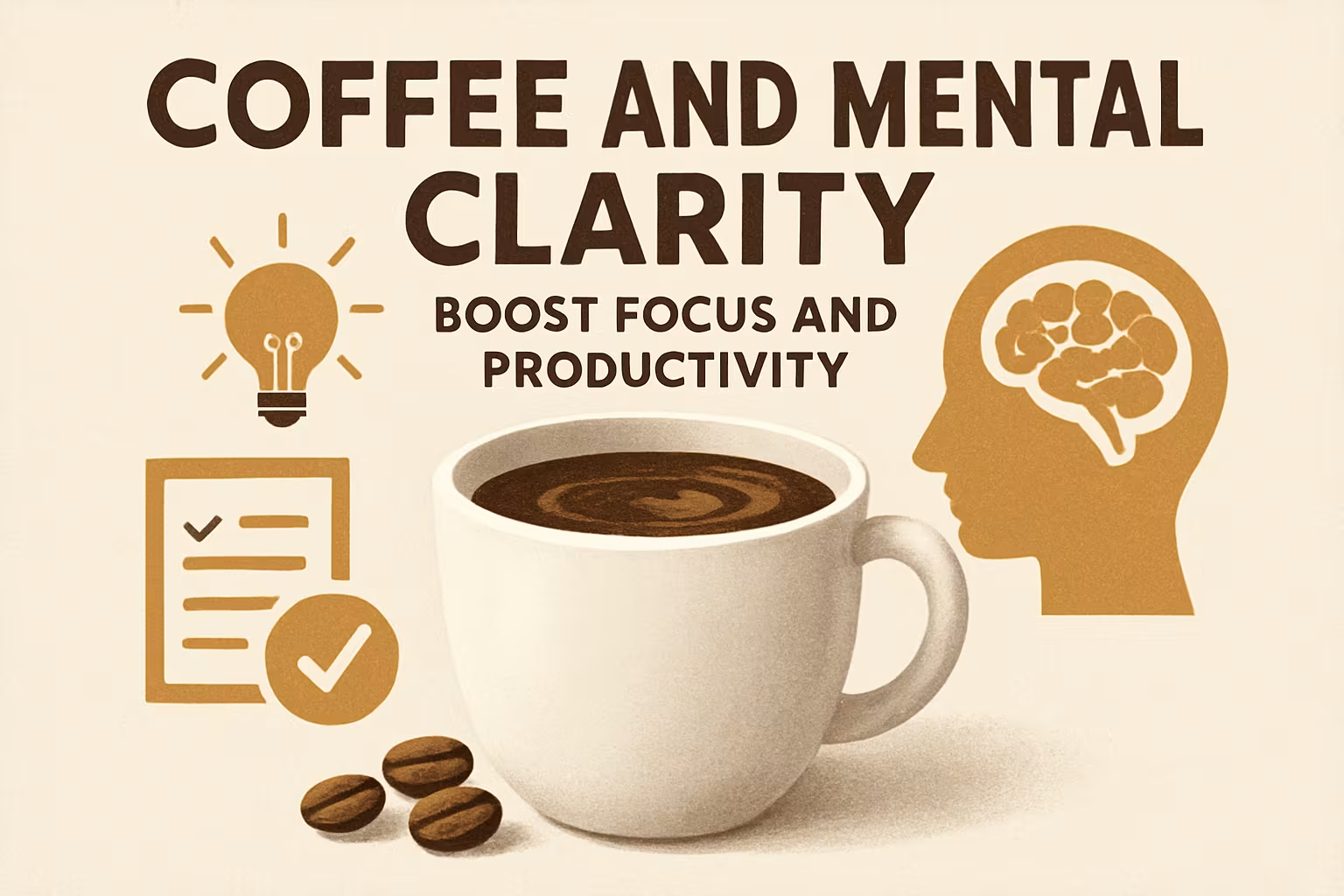Discover the science behind coffee and mental clarity. Learn how caffeine impacts focus, memory, and mood, the best times to drink coffee for brain power, and tips to maximize benefits while avoiding side effects for sustained mental performance.
Coffee and Mental Clarity: Boost Focus and Productivity
It’s 8:00 a.m., you have a deadline looming, and your mind feels like it’s moving through fog. You reach for a steaming cup of coffee, take that first satisfying sip, and within minutes the haze begins to lift. This daily ritual isn’t just a comfort — for millions of people, coffee and mental clarity go hand in hand. But what exactly is happening in your brain? And how can you harness coffee’s cognitive benefits without falling into the traps of jitters, anxiety, or burnout? Let’s explore the fascinating intersection of caffeine, focus, and brain health, backed by science and practical experience.
How Coffee Affects Mental Clarity and Brain Function
Coffee is more than just a caffeinated beverage — it’s a complex chemical cocktail containing over a thousand compounds, many of which influence the brain. Caffeine, coffee’s most famous active ingredient, is a central nervous system stimulant that works by blocking adenosine receptors. Adenosine is a neurotransmitter responsible for promoting relaxation and sleepiness; when it’s blocked, you feel more awake and alert.
The Science of Caffeine and Neurotransmitters
Once caffeine enters the bloodstream (usually within 15–45 minutes of consumption), it crosses the blood–brain barrier and begins interacting with several neurotransmitters:
Dopamine – enhances motivation, reward, and mood
Norepinephrine – improves alertness and reaction speed
Acetylcholine – boosts attention and memory encoding
Serotonin – subtly elevates mood and emotional stability
“Caffeine doesn’t just wake you up — it fine-tunes your brain chemistry to keep you engaged and focused,” says Dr. Astrid Nehlig, neuroscientist and caffeine researcher.
This neurochemical shift explains why coffee is so closely linked with mental performance, especially in tasks requiring sustained attention.
See more: Single Origin vs Blend Coffee: Which Should You Choose?
How Coffee Improves Focus and Reaction Time
Numerous studies confirm that moderate coffee consumption can significantly enhance focus, vigilance, and reaction time. In one meta-analysis published in Psychopharmacology, caffeine improved performance in tasks requiring sustained attention by 12–16%, with the greatest impact seen in individuals who were slightly sleep-deprived.
Practical examples of coffee’s focusing power include:
Surgeons drinking coffee before complex procedures to maintain precision over long hours
Students timing their coffee intake before study sessions or exams to sustain concentration
Athletes using coffee pre-competition to sharpen reflexes and decision-making speed
Coffee’s Role in Short-Term vs Long-Term Memory
The impact of coffee on memory is nuanced. Short-term memory — your ability to temporarily hold and use information — gets a notable boost from caffeine’s stimulation of the hippocampus. Long-term memory benefits may be more subtle, but a study in Nature Neuroscience found that consuming caffeine after a learning task improved memory consolidation for up to 24 hours.
| Memory Type | Effect of Coffee | Supporting Evidence |
|---|---|---|
| Short-Term Memory | Enhanced recall and task performance | Journal of Cognitive Neuroscience |
| Long-Term Memory | Improved consolidation post-learning | Nature Neuroscience (2014) |
The Cognitive Benefits of Coffee Backed by Research
While the personal anecdotes are compelling, science offers hard evidence that coffee supports various aspects of cognitive function beyond just wakefulness.
Enhanced Attention and Alertness
Caffeine’s ability to heighten selective attention means you can focus on relevant information while filtering out distractions — crucial in a world where notifications and multitasking are constant. Harvard Medical School researchers note that moderate coffee intake can improve sustained attention for several hours, especially in mentally demanding work environments.
Improved Mood and Motivation
Mental clarity isn’t just about focus; it’s also about mindset. Coffee’s mild stimulation of dopamine pathways can elevate mood, increase motivation, and even foster a sense of social connection. This is partly why coffeehouses have historically been hubs for creative and intellectual exchange, from 17th-century London coffeehouses where scientists and writers gathered, to modern co-working cafés buzzing with laptops and lattes.
Potential Protection Against Cognitive Decline
Perhaps one of the most exciting areas of research is coffee’s potential role in reducing the risk of neurodegenerative diseases like Alzheimer’s and Parkinson’s. A longitudinal study from the Journal of Alzheimer’s Disease found that coffee drinkers had a 16% lower risk of developing Alzheimer’s, while a meta-analysis in Neurology linked moderate coffee consumption with a significantly reduced risk of Parkinson’s disease. Antioxidants such as chlorogenic acids in coffee may combat oxidative stress, a key factor in brain aging.
The Best Times to Drink Coffee for Maximum Mental Performance
One of the most overlooked factors in the coffee and mental clarity equation is timing. Drinking coffee at the right moment can amplify its benefits, while poor timing can blunt its effects or disrupt sleep.
Aligning Coffee Intake with Circadian Rhythm
Your body’s natural circadian rhythm governs alertness, and cortisol — the “alertness hormone” — peaks naturally about 30–45 minutes after waking. Drinking coffee too early, when cortisol is high, may reduce its effectiveness and build tolerance faster. Experts recommend waiting 60–90 minutes after waking before your first cup for maximum impact.
Coffee and Morning Cortisol Levels
If you wake up at 7:00 a.m., your cortisol peak will likely be between 7:30 and 8:00 a.m. That means the optimal first coffee window is around 8:30–9:00 a.m., when cortisol begins to decline and caffeine can take over as your primary alertness booster.
Strategic Coffee Breaks for Sustained Productivity
For extended mental performance — like during long study sessions or work projects — split your coffee intake into smaller doses rather than consuming a large amount all at once. This “caffeine microdosing” approach helps avoid energy crashes and maintains steady mental clarity throughout the day.
“The timing of coffee is as important as the quality of coffee — drink it with purpose, not just habit.” – Lyoncafe Performance Coffee Guide
Coffee and Creativity: Does It Help or Hinder?
The relationship between coffee and creativity is complex. For some, caffeine sharpens convergent thinking — the ability to find a single, correct solution to a problem. For others, too much stimulation can hinder divergent thinking, which is crucial for brainstorming and generating multiple ideas.
Coffee’s Role in Divergent Thinking
Research suggests that low to moderate doses of caffeine can enhance creativity in structured tasks, especially when you need to combine logic with imagination. However, for open-ended creative exploration, a calmer state may be more conducive.
Balancing Stimulation and Relaxation for Creative Flow
Many creative professionals combine coffee with relaxation techniques — such as deep breathing or short walks — to maintain the mental balance needed for “flow state.” Some pair coffee with L-theanine, an amino acid found in green tea, to smooth out caffeine’s stimulating edges while preserving focus and mental clarity.
How to Maximize the Mental Clarity Benefits of Coffee
To get the most out of coffee and mental clarity, you need more than just a good bean — you need the right habits, pairings, and mindset. Coffee can be a powerful cognitive ally, but only when consumed with intention.
Choosing the Right Coffee Type and Roast
Different roasts and bean types influence how coffee affects your brain. Light roasts often contain slightly more caffeine and higher acidity, which can give a sharper mental kick ideal for short bursts of focus. Medium roasts strike a balance, delivering a smoother energy curve without overwhelming the senses. Dark roasts offer lower acidity and a deeper flavor, making them a good choice for those sensitive to jitters. Single-origin coffees from Ethiopia or Kenya may enhance sensory alertness with bright, fruity profiles, while blends often provide consistent, balanced stimulation suitable for daily routines.
Pairing Coffee with Nootropics or L-Theanine
To enhance mental clarity without overstimulation, some professionals combine coffee with L-theanine, an amino acid known for its calming effects. The pairing can produce a state of “calm alertness,” reducing the edginess sometimes associated with caffeine while maintaining sharp focus. Others add nootropics such as lion’s mane mushroom for potential neuroprotective benefits. At Lyoncafe, our Brain Boost Blend integrates ethically sourced coffee with natural L-theanine and adaptogens to provide sustained cognitive performance for busy workdays.
Hydration, Nutrition, and Sleep Synergy
Coffee works best when part of a broader wellness strategy. Staying hydrated prevents the mild diuretic effect of caffeine from impacting performance. Eating a balanced breakfast — such as protein and complex carbs — can stabilize blood sugar, preventing energy crashes. And perhaps most importantly, prioritizing quality sleep ensures that caffeine complements your alertness instead of compensating for chronic fatigue. As the proverb goes: “You can’t pour from an empty cup.”
Risks and Limitations: When Coffee Can Reduce Mental Clarity
Like any powerful tool, coffee can work against you if overused or poorly timed. Understanding its limitations is key to protecting both mental clarity and long-term brain health.
Caffeine Overload and Anxiety
Too much caffeine can overstimulate the nervous system, triggering symptoms like rapid heartbeat, nervousness, and difficulty concentrating. This paradoxical effect is particularly common in anxiety-prone individuals. Harvard Health suggests capping daily intake at 400 mg (roughly 3–4 cups of brewed coffee) for most healthy adults, and even less for those sensitive to stimulants.
Sleep Disruption and Brain Fog
Drinking coffee too late in the day can delay melatonin release and disrupt deep sleep cycles, leading to next-day brain fog — the very opposite of mental clarity. As a rule of thumb, avoid caffeine within 6–8 hours of bedtime.
Tolerance Build-Up and Diminished Effects
Regular high caffeine intake can cause your body to adapt, reducing the energizing effects over time. Cycling your intake — for example, having one or two low-caffeine days per week — can help reset sensitivity.
Coffee Alternatives for Mental Clarity
For those who want variety or need to reduce caffeine, there are excellent alternatives that still support focus and mental performance.
Matcha, Green Tea, and Yerba Mate
Matcha provides a gentler caffeine lift along with L-theanine for sustained focus. Green tea offers antioxidant benefits, while yerba mate delivers a smooth, social energy prized in South American culture.
Adaptogenic and Herbal Options
Adaptogens like ginseng and Rhodiola rosea may improve mental stamina and stress resilience without the crash. Herbal infusions such as rosemary tea have shown promise in small studies for enhancing memory and alertness.
Final Verdict: Coffee and Mental Clarity
Coffee and mental clarity are a natural pairing when approached mindfully. The science is clear: caffeine can sharpen focus, enhance memory, and even protect long-term brain health. But the benefits are maximized when coffee is consumed at the right time, in the right amount, and as part of a balanced lifestyle.
Summary of Benefits and Best Practices
| Strategy | Why It Works | Practical Tip |
|---|---|---|
| Time coffee 60–90 min after waking | Aligns with cortisol rhythm | Improves alertness without tolerance build-up |
| Choose roast by activity type | Match caffeine profile to task | Light roast for short bursts, medium for balanced work |
| Pair with L-theanine or adaptogens | Smooths stimulation | Consider blends like Lyoncafe Brain Boost |
| Avoid caffeine after 2 PM | Prevents sleep disruption | Supports next-day clarity |
| Stay hydrated and eat well | Supports sustained energy | Drink water alongside coffee |

My name is Kara Chavez, and I love coffee. I love making the best coffees – espresso, latte, macchiato. I always strive for perfection in my barista skills, and I take great pride in bringing delicious cups of coffee to my customers.
I’ve been in the coffee industry for many years, and I know everything there is to know about brewing the perfect cup of coffee. My passion for coffee shines through in every cup I make, and I hope you’ll stop by soon so I can share my love of coffee with you!

